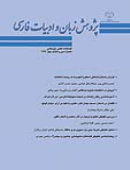تحلیل تطبیقی تجربة دینی نزد سهروردی و حافظ
محورهای موضوعی : پژوهشهای ادبیات کلاسیک ایرانایمان زرگران 1 , حسینعلی قبادی 2
1 -
2 -
کلید واژه: سهروردی حافظ تجربه دینی عالم مثال شاهد قدسی,
چکیده مقاله :
ادبیات فارسی به ویژه ادبیات عرفانی، با اندیشه های اشراقی سهروردی آمیختگی فراوان دارد. این آمیزش و تأثرِ حاصل از آن عمدتاً به واسطه آثار رمزی اوست که آرای فلسفی خود را در این متون به زبان ادبی بیان کرده است. وی در آثار خود از تجارب عرفانی، گاه به صورت مستقیم و گاه در قالب داستان هایی رمزی سخن گفته است و گاه در قالب ناظری بیرونی به طبقهبندی و نظاممند کردن انواع این تجربیات پرداخته است. حافظ نیز در مقام شاعری که با میراث ادبی پیش از خود همواره در ارتباط بوده است، گاه تجارب منحصر به فردی را در قالب غزل ارائه می دهد که در مقام مقایسه، شباهت های چشمگیری با تجربیات سهروردی دارد. در مواجهه با امر قدسی که در بنیان بی صورت و تعین است، این ذهن صاحب تجربه است که در فرآیند تجربه به آن شکل میبخشد. میتوان مدعی شد که آثار سهروردی در شکلدهی به ساختار ذهن حافظ برای تعین بخشیدن به این تجارب مؤثر بوده است. گاه شباهتهای این تجارب مربوط به مکان این رویدادهاست که همان عالم مثال و هورقلیای مورد نظر سهروردی است و گاه در کیفیت تجربه است که به صورت تجربههای دیداری و شنیداری و بویایی پدیدار گشتهاند. توصیف تجربهها به صورت برق زودگذر یا خورشید نیمهشب، ملاقات با شاهد قدسی و پیر نورانی از مواردی هستند که در ساختار نهایی میان حافظ و سهروردی، شباهتهای چشمگیری دارند.
Persian literature and especially mystical literature, is largely mixed with illuminationist thoughts of Sohrevardi (Suhrawardi). This blending and the resulted effect are mainly due to his mysterious works in which he expressed his philosophical ideas in a literary language. In his works, the religious experiences are expressed in different ways: sometimes directly, sometimes in the form of mysterious stories, and sometimes he classifies and systematizes these experiences as an external observer. Hafez as a poet, who has always been connected to the previous literary heritage, sometimes communicates such unique experiences through sonnet which considered being significantly similar to Sohrevardi’s experiences. Facing a holy idea which is indefinable and formless in nature, this is the experiencer’s mind which forms the experience in this process. It can be claimed that Sohrevardi’s works played a role in forming the structure of Hafez’s mind. Sometimes these experiences are similar regarding the location of the events which is Sohrevardi’s “world of ideas” or “hovargheliya”, and sometimes the similarity is in the quality of the experience manifested in the form of visual, auditory and olfactory experiences. The description of experiences as a fleeting lightning or midnight son, meeting the sacred witness (Shahid) and the holy Pir (leader) are some of the common features in Hafez and Sohrevardi’s works.


